

Foresight emerging trends 2017 au. 12 Emerging Global Trends That Bring Hope for 2018. Upcoming trends for business and environment in 2018 - WWF UK Blog. 2017 gave us plenty to talk about in the world of sustainable business.
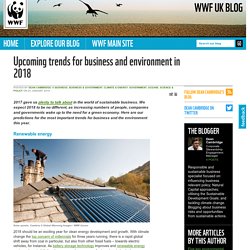
We expect 2018 to be no different, as increasing numbers of people, companies and governments wake up to the need for a green economy. Here are our predictions for the most important trends for business and the environment this year. Renewable energy Solar panels, Cumbria © Global Warming Images / WWF-Canon 2018 should be an exciting year for clean energy development and growth. Global investment in renewables is set to increase exponentially, with Bloomberg’s New Energy Outlook estimating that they will account for almost three quarters of global energy investment between now and 2040. Electric vehicles. Four megatrends and the future of work. What will workplaces be like in the future?
Four mega-trends include automation, climate change, outsourcing and demographic change. – amcep
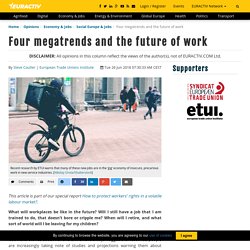
Environmental Destruction Thrives on Tax Havens, says Paper. It’s not just hedonistic politicians: illegal fishing, deforestation and other forms of environmental degradation thrive off of the protections offered by the world’s tax havens, according to a new paper by researchers at Stockholm University.
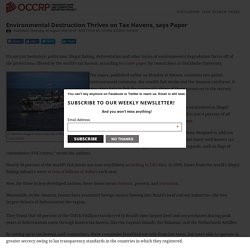
A Taiwanese-flagged vessel suspected of illegal fishing (US Coast Guard) The paper, published online on Monday in Nature, examines two global environmental commons--the world’s fish stocks and the Amazon rainforest. Globalization may actually be better for the environment. The increasing pace of globalization and how it affects the environment has been a major global concern.
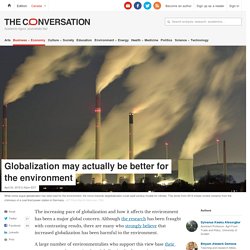
Although the research has been fraught with contrasting results, there are many who strongly believe that increased globalization has been harmful to the environment. A large number of environmentalists who support this view base their arguments on the premise that globalization leads to an increase in global demand, resulting in increased production. Globalisation, Inequality, Energy - About the conference. Electricity market proposals undermine climate change and energy poverty challenge. Climate actions that lift people out of poverty are often most cost-effective. He researches the link between climate and development and contributed to the IPCC assessment published on 8 October, which looked at the impact of global warming of a 1.5˚C increase and how to limit it to this level.
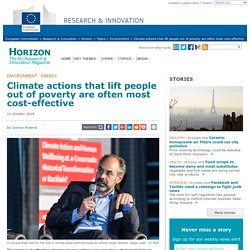
The IPCC report looks, among other things, at the impact of climate change on development. What do we know now that we didn’t before? ‘What the report really clarifies well is the big difference between 1.5 and 2 (degrees), in terms of impact. Can Reducing Income Inequality Decouple Economic Growth from CO2 Emissions? - Julius Alexander McGee, Patrick Trent Greiner, 2018. Climate change will only affect the economic growth of the poorest nations. Climate change looks set to slow productivity only in the world's poorest nations, according to new research from University of Sussex and La Sapienza economists.
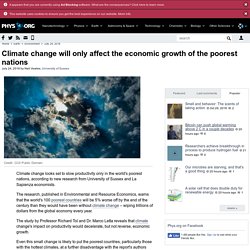
The research, published in Environmental and Resource Economics, warns that the world's 100 poorest countries will be 5% worse off by the end of the century than they would have been without climate change – wiping trillions of dollars from the global economy every year. The study by Professor Richard Tol and Dr. Marco Letta reveals that climate change's impact on productivity would decelerate, but not reverse, economic growth.
Even this small change is likely to put the poorest countries, particularly those with the hottest climates, at a further disadvantage with the report's authors calling on global leaders to develop policies to tackle climate change and poverty reduction simultaneously. Using newly developed data on total productivity growth, Dr. Explore further: How China is taking on climate change. Climate-Change Policies Can Be Punishing for the Poor. Why and how might investors respond to economic inequality? Economic inequality – the gap between the rich and poor in income and wealth – has received extensive and continuing attention in public and academic discourse across the globe since the financial crisis.
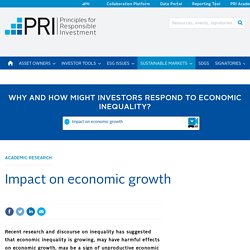
It has entered the political mainstream, becoming the subject of scrutiny by global policymakers at events like the World Economic Forum annual meetings in Davos and intense civic mobilizations like Occupy Wall Street. In the United States, President Obama has called inequality “the defining issue of our time.” Wind and solar are thriving in Europe — without any subsidies. The French electric utility Engie announced last week that it’s going to develop 300 megawatts of wind energy across nine wind farms in Spain, backed by $350 million (€300 million) in investment.
Here’s the key: It’s doing all this without government support. And it’s far from the only European energy company willing to make a bet like this. In March, the Swedish power company Vattenfall announced it won its bid to build a 700 MW offshore wind farm in the Netherlands, which would make it the first nonsubsidized wind energy project in the land of windmills. Over in Germany, in the country’s first competitive power auction last spring, the federal grid regulator accepted four bids for a total of 1,490 MW of offshore wind capacity in the North Sea, with an average subsidy rate of €0.44 per kilowatt-hour.
That’s low. Social and political impacts of renewable energy: Literature review. JavaScript is disabled on your browser.
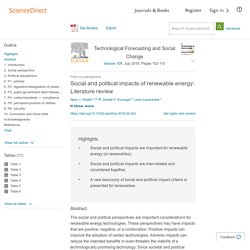
Please enable JavaScript to use all the features on this page. Highlights. Renewable energies continue to gain ground in Europe. For the very first time, 2017 saw renewable energies (wind, solar, biomass and hydropower) generate more electricity than coal in Europe, according to a report by Sandbag and Agora Energiewende*, respectively British and German think tanks.
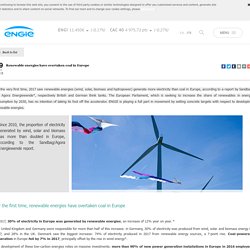
The European Parliament, which is seeking to increase the share of renewables in energy consumption by 2030, has no intention of taking its foot off the accelerator. ENGIE is playing a full part in movement by setting concrete targets with respect to developing renewable energies. Samsung to source 100% renewable energy in Europe, US and China. The key trends that will shape renewable energy in 2018 and beyond. Throughout the entire modern age, mankind has used fossil fuels to meet its energy requirements.
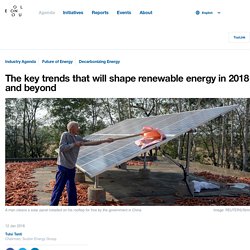
Coal, oil and natural gas have lit homes and powered machinery for centuries, driving civilization forward. But as human development accelerated, the unsustainability of such energy became apparent. Global fuel supplies deteriorated and the atmosphere became more polluted. The search for renewable sources of energy began, to ensure a sustainable future. Political power and renewable energy futures: A critical review. 1. Introduction Our present era of fossil-fueled economies, societies and civilizations [1], [2], [3] has given rise to an anomalous and dangerous moment for contemporary humanity and our shared biosphere [4].
Europe may thrive on renewable energy despite unpredictable weather. Researchers in Ireland, Switzerland, and the United Kingdom have shown how long-term weather patterns affect wind and solar renewable energy technologies across Europe. SE - Impact of renewables and trading on power grid frequency fluctuations - Queen Mary University of London.
Found that small grids display large frequency deviations than larger grids. Comparing different regions showed that a larger share of renewable generation resulted in larger frequency deviations. – amcep
Energy efficiency: The missing link. Natural capital key to global prosperity, Oxford economists warn — University of Oxford Social Sciences Division. Image: www.shutterstock.com New research by the Oxford Martin School, commissioned by the Green Economy Coalition, has revealed that governments can be ignorant to the economic value of nature, and the extent to which national and global wealth depends on it. The researchers agree that this natural capital is the basis for all human prosperity. The EU needs a stability and wellbeing pact, not more growth. This week, scientists, politicians, and policymakers are gathering in Brussels for a landmark conference. The aim of this event, organised by members of the European parliament from five different political groups, alongside trade unions and NGOs, is to explore possibilities for a “post-growth economy” in Europe.
For the past seven decades, GDP growth has stood as the primary economic objective of European nations. How to Grow the Economy While Reducing Inequality. Exploring the link between environmental pollution and economic growth in EU-28 countries: Is there an environmental Kuznets curve? Why economic growth is not compatible with environmental sustainability. 'Growth for the sake of growth' remains the credo of all governments and international institutions, including the European Commission. Economic growth is presented as the panacea that can solve any of the world's problems: poverty, inequality, sustainability, you name it.
It's not business as usual for vegan businesses. New Stock Index Makes It Easier For Vegans And Environmentalists To Invest. Vegans and those who care about the environment are about to find it a whole lot easier to invest in companies that align with their ethical values, thanks to the creation of a new stock index. The US Vegan Climate Index excludes companies listed on the Solactive US Large Cap Index (a proxy for the S&P 500 Index) that are involved in animal testing, animal-derived products, animals in sport and entertainment, fossil fuel, energy production from fossil fuel, other environmental and human rights concerns, military and defense, and tobacco.
Watch These 5 Sustainable Investing Trends. Investing in Green Technology – the Future Is Now. Traders Rush to Move Diesel Up Rhine as Water Level Ebbs. Traders are racing to move barges of diesel and gasoil up the Rhine River, one of Europe’s key shipping arteries, as declining water levels caused by a dry spell impede transport. The Rising Cost of Resources and Global Indicators of Change. Will AC Put a Chill on the Global Energy Supply? This Article From Issue September-October 2013. Norsk Hydro to sell low-carbon aluminium in climate push. How we’re becoming carbon positive in our operations. We have a network of environmental managers around the world, who bring our ambitions to life. Climate models underestimate economic damages and overestimate policy costs. EllenMacArthurFoundation Growth Within July15.
Report aims to contribute to a fact base to inform the debate around the circular economy; particularly in Europe. It provides a figure indicating the potential economic benefit of a circular economy approach for Europe ($2.2 trillion per year by 2030) – amcep
Solar industry promises ‘jobs bonanza’ if EU lifts China duties. Plastic taxes vital to cut pollution, new study finds. Climate change means meat taxes are ‘increasingly probable’ Agriculture expert: Like organic, transition to digital farming needs support. G7 can tackle five priorities with one investment: agricultural research. How economic inequality exacerbates environmental degradation.
REDUCING INEQUALITIES, AN ESSENTIAL CONDITION FOR THE ACCEPTABILITY OF ENVIRONMENTAL POLICIES – SDG Watch Europe. Socialeurope.
Despite equality coefficients (e.g. Gini) in Southern Europe (Greece, Spain, Italy, Portugal, Cyprus) indicating roughly stable levels of equality, deeper analysis shows that there remains worsening inequality- e.g. due to things like cuts in income meaning stable inequality implies a worsening of inequality. Call for analyses of inequality to go well beyond typical inequality indices. – amcep
Spatial variation in determinants of agricultural land abandonment in Europe. How climate change is affecting insurance. Insurers Will Be Hard-Hit By Climate Change But They're Not Investing In The Low-Carbon Economy.